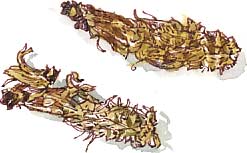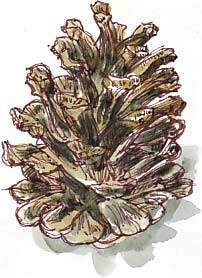Inner Monologues
Richard Bell's Wild West Yorkshire Nature Diary, Tuesday, 27th July 2010
previous | home
page | this month | e-mail
richard | next

 WE
ARRIVE a little early for visiting, so walk around the hospital through the
leafy grounds. Under a small group of pines we find these nibbled cones which
I guess are the work of the grey squirrel which climbs one
of the trees as we approach.
WE
ARRIVE a little early for visiting, so walk around the hospital through the
leafy grounds. Under a small group of pines we find these nibbled cones which
I guess are the work of the grey squirrel which climbs one
of the trees as we approach.
I was listening to Word of Mouth on Radio 4 this afternoon which explored
an unusual condition related to too much thinking about words, or perhaps I
should say thinking in words. Tim Parks, a writer
who has struggled with a tendency to think in continuous inner monologues, explained
that when we think about words the various muscles associated with speech start
to tense in readiness for the expected delivery of those words. This tension
can lead mysterious pains and to stress.
As a keen writer he found that even when he took up meditation that too became
an inner monologue:
'I've now acheived inner peace by banishing words from my mind altogether.'
to which his inner monologue replied:
'Yes but that statement was in words so you haven't really stopped thinking
in words . . . '
And so it went on.
 I'm
lucky in my compulsion to draw because it gives me a break from thinking in
words. The nibbled cones are a good example of a subject which discourages the
use of words as you draw. There are plenty of shapes in there but few to which
the mind could add a label.
I'm
lucky in my compulsion to draw because it gives me a break from thinking in
words. The nibbled cones are a good example of a subject which discourages the
use of words as you draw. There are plenty of shapes in there but few to which
the mind could add a label.
The complete cone is more prone to analysis in words as there are regular shield-shapes
at the ends of each scale and a spiral pattern in their arrangement. An architectural
subject generally gets me thinking in terms of words as I draw chimney pots,
drain-pipes and window frames. Drawing humans also encourages you to slip into
an inner monologues with worries about noses, ankles and other numerous labelled
features of the face and body.
Nibbled cones are a fairly safe refuge . . . unless you start thinking 'should
I go for Art Nouveau, or Gothic . . . or Cubist?', replacing labels for things
with labels for styles.
Links: Word
of Mouth , Tim Parks
previous | home
page | this month | e-mail
richard | next

 WE
ARRIVE a little early for visiting, so walk around the hospital through the
leafy grounds. Under a small group of pines we find these nibbled cones which
I guess are the work of the grey squirrel which climbs one
of the trees as we approach.
WE
ARRIVE a little early for visiting, so walk around the hospital through the
leafy grounds. Under a small group of pines we find these nibbled cones which
I guess are the work of the grey squirrel which climbs one
of the trees as we approach. I'm
lucky in my compulsion to draw because it gives me a break from thinking in
words. The nibbled cones are a good example of a subject which discourages the
use of words as you draw. There are plenty of shapes in there but few to which
the mind could add a label.
I'm
lucky in my compulsion to draw because it gives me a break from thinking in
words. The nibbled cones are a good example of a subject which discourages the
use of words as you draw. There are plenty of shapes in there but few to which
the mind could add a label.